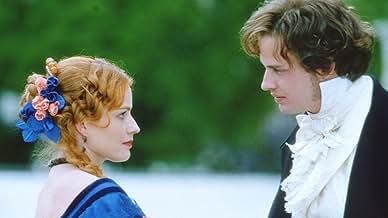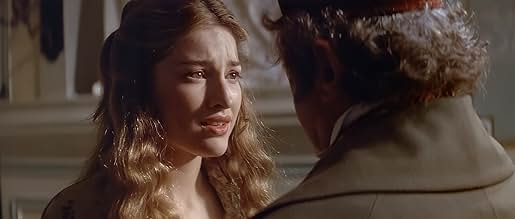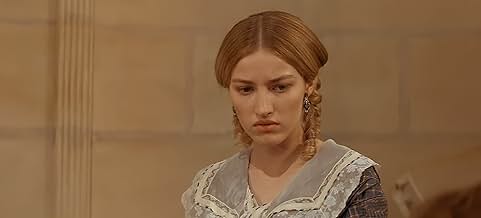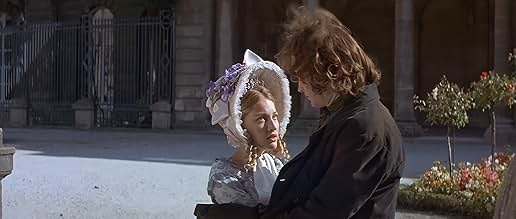IMDb रेटिंग
6.2/10
3 हज़ार
आपकी रेटिंग
अपनी भाषा में प्लॉट जोड़ेंWhen her sister dies in 1846, Bette moves from the château to Paris to work as a theater seamstress. She helps a handsome, starving artist. When her niece lures him away from her, she plans ... सभी पढ़ेंWhen her sister dies in 1846, Bette moves from the château to Paris to work as a theater seamstress. She helps a handsome, starving artist. When her niece lures him away from her, she plans a devious revenge.When her sister dies in 1846, Bette moves from the château to Paris to work as a theater seamstress. She helps a handsome, starving artist. When her niece lures him away from her, she plans a devious revenge.
- निर्देशक
- लेखक
- स्टार
- पुरस्कार
- 1 जीत और कुल 1 नामांकन
फ़ीचर्ड समीक्षाएं
I'm not familiar with Balzac's novel, but I've read a ton of Romantic literature. And this is one of its classic variations (The virtuous are redeemed). I would never have selected this movie myself (friends did) but I enjoyed it. If I described this as Madame Iago, you'd have the entire plot. Nothing is quite so much fun as watching someone who's been disrespected revenging herself on a crowd, especially after how needlessly cruel they've been. Since the playing field will never roll the arrangement back in Bette's favor, why not just destroy everyone? It's like a bomb went off when she's done. I am in no way a fan of Lange, but she's adequate (while looking distressingly like Jim Carrey in drag).
On the minus side, the lead-up to the 1848 Revolution is trivialized. The writing is extremely weak (Point A is always too overtly connected to Point B), and the lighting of every scene is too brazen. The accents are all over the place, which becomes very distracting.
On the minus side, the lead-up to the 1848 Revolution is trivialized. The writing is extremely weak (Point A is always too overtly connected to Point B), and the lighting of every scene is too brazen. The accents are all over the place, which becomes very distracting.
A somewhat sanitised version of the Balzac classic which departs disappointingly from the original story. Jessica Lang is far too pretty a version of the downtrodden, wizened old hag Bette of the original and so conveys none of her deviousness in the many schemes to avenge herself against her condescending relatives. Missing completely from the film is arch-whore Valerie, a central character of the book's plot, who dies a grim death from a disfiguring tropical disease at the conclusion, thus removing an important moral message of the tale. Most of Balzac's other works viz. Madame Bovary, contain one of these. That said, costumes and furniture are fairly faultless which shows Hollywood has at least tried to do justice to a great book.
Jessica Lange is just fabulous in this movie. I had to watch it a couple of times to see where Elizabeth Shue fits in. The music was very enjoyable. I thought the movie was very well made, and enjoyed the little cameos of the musical director.
The words 'adapted from a novel by Honore de Balzac' would suggest to most cinema-goers an example of French heritage cinema, like the excellent version of his 'Le Colonel Chabert' made with Gerard Depardieu in the early nineties. Although Balzac is often claimed by the French as their greatest novelist, he has not captured the imagination of the Anglo-Saxon reading or cinema-going public in the same way as some of his compatriots such as Hugo, Verne, Flaubert or Dumas. Apart from 'Cousin Bette', I am not aware of any other English-language feature films based on his works.
The story is set in the Paris of the 1840s. Bette Fischer is a middle-aged spinster who works as a theatrical costumer. She is not well-off financially and lives in a sparsely-furnished apartment, although she has more elevated social connections; her cousin Adeline, who dies at the beginning of the film, was married to the influential Baron Hulot. Bette, however, had little love for Adeline, as she was jealous of her cousin's beauty and of her marriage to a successful man. She falls in love with Count Wenceslas Steinbock, a young Polish sculptor who lives in the same apartment block, but loses her sweetheart to Adeline's pretty young daughter Hortense. Bette's dislike of the Hulot family now turns to hatred, and she plots her revenge. She forms an alliance with Jenny Cadine, an opera singer-cum-courtesan and a former mistress of the Baron, who has given her up in accordance with his wife's dying wishes. Jenny, with Bette's encouragement, tries to ruin the happiness of the young couple by seducing Wenceslas away from Hortense.
Those who are familiar with Balzac's novel will realise from the above summary that the film does not stick closely to its plot. Adeline, for example, dies at the very end of the novel, not at the beginning. The real villainess of the novel is not Jenny (who plays only a minor part) or even Bette (who is portrayed as pitiable as well as spiteful), but Valerie Marneffe, the scheming, hypocritical, gold-digging and thoroughly corrupt middle-class housewife who becomes the mistress of Hulot, Wenceslas and several other men. Valerie does not appear in the film at all; nor do Hulot's other mistresses. The film concentrates on the relationships between Bette, Wenceslas, Hortense and Jenny; Hulot, a major figure in the book, becomes less important in the film. The ending of the film, in particular, seems unsatisfactory. There is a confused attempt to tie the story of the Hulot family in with the revolution of 1848, an event that had not even taken place when the novel was written in 1846. This was probably inspired by the standard school textbook idea that the French Revolution represented a corrupt aristocracy getting its just deserts, but this interpretation seems to confuse the events of 1848 with those of 1789, and it is not one that is likely to have appealed to the conservative monarchist Balzac. The replacement of the constitutional monarchy of the amiable 'Roi Citoyen' Louis-Philippe with the regime of the unscrupulous adventurer Napoleon III was not the most glorious episode in French history.
Like some other reviewers, I felt that some of the roles were miscast. Jessica Lange, even in her late forties, was far too attractive for the role of the dried-up, embittered spinster Bette. (Balzac chose the name because of its similarity to the French word 'bete', meaning 'beast'). Bette's driving force is sexual jealousy of the beauty of other women, particularly of Adeline and Hortense, but Miss Lange's character is not a woman who would need to feel jealous of anyone. Kelly Macdonald's Hortense seemed too insipid. Hugh Laurie, in his late thirties at the time the film was made, was far too young for the role of Hulot. The character envisaged by Balzac was probably in his sixties and the father of two adult children. (Hortense has an elder brother, Victorin). Laurie, better known in Britain as a comedian than as an actor, plays Hulot as a largely comic figure, whereas in the novel he is a tragic one, a distinguished public servant ruined by his sexual passions and his financial improvidence.
The book forms part of the sequence of novels which Balzac intended as a close examination of French society and to which he gave the title of 'La Comedy Humaine'. Despite this title, most of the individual novels, 'La Cousine Bette' among them, are deeply serious rather than humorous, but the filmmakers here seem to treat the story as a black comedy. On the whole, in fact, this approach works well. The story moves along at a brisk pace, helped on its way by some witty songs. The title of one of these, 'Love is the Master, You are the Slave', is perhaps the best encapsulation one could wish for of the film in a single phrase; most of the characters are enslaved by their sexual desires. Jessica Lange may be physically wrong for the part, but she nevertheless throws herself into her role with gusto and makes a splendidly hissable pantomime villainess. Elisabeth Shue's singing voice is not really strong enough to make her convincing as an opera singer, but she is well able to convey Jenny's seductive charms. Unlike some, I found no difficulty with the fact that Bette and Jenny had American accents; both, after all, were originally peasant girls from Alsace-Lorraine (Bette's surname implies that her native language is probably German rather than French) and would not have spoken French with the Parisian accents of the other characters. There are some good performances in minor roles; Toby Stephens makes a suitably dull and priggish Victorin, a man who is the complete antithesis of his father, and Bob Hoskins is in superb form as the greasy businessman Crevel. The name is derived from 'crever', meaning to burst, and Hoskins's Crevel is a man positively bursting with his own self-importance. The film may take liberties with Balzac, but on the whole it is an enjoyable one which works reasonably well in its own right. 6/10
The story is set in the Paris of the 1840s. Bette Fischer is a middle-aged spinster who works as a theatrical costumer. She is not well-off financially and lives in a sparsely-furnished apartment, although she has more elevated social connections; her cousin Adeline, who dies at the beginning of the film, was married to the influential Baron Hulot. Bette, however, had little love for Adeline, as she was jealous of her cousin's beauty and of her marriage to a successful man. She falls in love with Count Wenceslas Steinbock, a young Polish sculptor who lives in the same apartment block, but loses her sweetheart to Adeline's pretty young daughter Hortense. Bette's dislike of the Hulot family now turns to hatred, and she plots her revenge. She forms an alliance with Jenny Cadine, an opera singer-cum-courtesan and a former mistress of the Baron, who has given her up in accordance with his wife's dying wishes. Jenny, with Bette's encouragement, tries to ruin the happiness of the young couple by seducing Wenceslas away from Hortense.
Those who are familiar with Balzac's novel will realise from the above summary that the film does not stick closely to its plot. Adeline, for example, dies at the very end of the novel, not at the beginning. The real villainess of the novel is not Jenny (who plays only a minor part) or even Bette (who is portrayed as pitiable as well as spiteful), but Valerie Marneffe, the scheming, hypocritical, gold-digging and thoroughly corrupt middle-class housewife who becomes the mistress of Hulot, Wenceslas and several other men. Valerie does not appear in the film at all; nor do Hulot's other mistresses. The film concentrates on the relationships between Bette, Wenceslas, Hortense and Jenny; Hulot, a major figure in the book, becomes less important in the film. The ending of the film, in particular, seems unsatisfactory. There is a confused attempt to tie the story of the Hulot family in with the revolution of 1848, an event that had not even taken place when the novel was written in 1846. This was probably inspired by the standard school textbook idea that the French Revolution represented a corrupt aristocracy getting its just deserts, but this interpretation seems to confuse the events of 1848 with those of 1789, and it is not one that is likely to have appealed to the conservative monarchist Balzac. The replacement of the constitutional monarchy of the amiable 'Roi Citoyen' Louis-Philippe with the regime of the unscrupulous adventurer Napoleon III was not the most glorious episode in French history.
Like some other reviewers, I felt that some of the roles were miscast. Jessica Lange, even in her late forties, was far too attractive for the role of the dried-up, embittered spinster Bette. (Balzac chose the name because of its similarity to the French word 'bete', meaning 'beast'). Bette's driving force is sexual jealousy of the beauty of other women, particularly of Adeline and Hortense, but Miss Lange's character is not a woman who would need to feel jealous of anyone. Kelly Macdonald's Hortense seemed too insipid. Hugh Laurie, in his late thirties at the time the film was made, was far too young for the role of Hulot. The character envisaged by Balzac was probably in his sixties and the father of two adult children. (Hortense has an elder brother, Victorin). Laurie, better known in Britain as a comedian than as an actor, plays Hulot as a largely comic figure, whereas in the novel he is a tragic one, a distinguished public servant ruined by his sexual passions and his financial improvidence.
The book forms part of the sequence of novels which Balzac intended as a close examination of French society and to which he gave the title of 'La Comedy Humaine'. Despite this title, most of the individual novels, 'La Cousine Bette' among them, are deeply serious rather than humorous, but the filmmakers here seem to treat the story as a black comedy. On the whole, in fact, this approach works well. The story moves along at a brisk pace, helped on its way by some witty songs. The title of one of these, 'Love is the Master, You are the Slave', is perhaps the best encapsulation one could wish for of the film in a single phrase; most of the characters are enslaved by their sexual desires. Jessica Lange may be physically wrong for the part, but she nevertheless throws herself into her role with gusto and makes a splendidly hissable pantomime villainess. Elisabeth Shue's singing voice is not really strong enough to make her convincing as an opera singer, but she is well able to convey Jenny's seductive charms. Unlike some, I found no difficulty with the fact that Bette and Jenny had American accents; both, after all, were originally peasant girls from Alsace-Lorraine (Bette's surname implies that her native language is probably German rather than French) and would not have spoken French with the Parisian accents of the other characters. There are some good performances in minor roles; Toby Stephens makes a suitably dull and priggish Victorin, a man who is the complete antithesis of his father, and Bob Hoskins is in superb form as the greasy businessman Crevel. The name is derived from 'crever', meaning to burst, and Hoskins's Crevel is a man positively bursting with his own self-importance. The film may take liberties with Balzac, but on the whole it is an enjoyable one which works reasonably well in its own right. 6/10
Most costume dramas about a poor relation follow a similar trail: The poor one, filled with high expectations and good intentions, gets the money and true love by suffering through a series of pitfalls, only to be winking at the audience by the ending credits. Our Cousin Bette gets there, but she chooses another road, perhaps more hazardous, but infinitely more entertaining for us.
This fascinating tale is about a relative who is treated poorly by everyone in her aristocratic family, while they themselves live in debt, denial, and high fashion. Jessica Lange plays the title character with a cynical smirk, as though she's daring every one to call her out, yet she knows – only too well - that people are so consumed by their own personal dramas that they ignore the fine details.
Described as "the bad seed who refused to blossom", Bette is the sister of Adeline, who languidly takes her time dying, while instructing her spinster sibling as to what flowers to lay on her casket. One look at the two – Adeline in her death-bed finery and Bette, in a basic drab dress, devoid of any adornment – and it's all too evident where the balance of power resides.
Bette: (to Jenny) "How could you know? You don't know who I was sacrificed to – to Adeline. They slapped me and caressed her. I went dressed like a wretch and she like a fine lady. Adeline, the garden, peel the vegetables, Bette. She never lifted a finger except to tie her ribbons."
Describing herself as a "country peasant", Bette lives in the slums of Paris, working as a costume seamstress to the reigning burlesque star of the day, Jenny Cadine (played by Elizabeth Shue), who vainly shows off her derrière before every final curtain is rung down. Jenny puts off the ticking clock of time by enjoying the attentions of her many rich – and generous - admirers, yet one fateful day encounters her worst nightmare.
Jenny: "I'm 24 I may as well be dead."
Bette: "You were 24 years old yesterday and it didn't seem to bother you then."
Jenny: "Today, while I was walking in the park, I came across a hideous old woman, face swollen and scratched; she stank of stale wine and sweat. In her filthy tresses she had placed a beauty patch, one red camellia I knew at once who she was - she was known as Carabine, the most famous courtesan in Paris. Everyone envied her dazzling shoulders, her milky skin. She had a neck so smooth it might have been turned on a lathe. Her trademark was a red beauty patch, a red camellia."
'Carabine? Is that you?', I asked.
'No, there is no Carabine, she has left me.'
Originally a novel by French author, Honore de Balzac, this modern version boasts an international cast of talent. Bob Hoskins (Cesar Crevel), Hugh Laurie (Baron Hector Hulot), Aden Young (Wenceslas), Kelly Macdonald (Hortense Hulot), and Geraldine Chaplin (Adeline Hulot) all twist and turn in time to Bette's song of vengeance. Set in Paris, during the pre-revolutionary period of 1846, screenwriters Seifert and Tarr turn Balzac's morality tale into a microcosm of the class resentments barely simmering just beneath the pearls and petticoats of Bette's shadow world. Yet she's nothing if not flexible, as she revises her best-laid plans in the face of cross and double-cross by family and high society associates alike.
Bette: "I'll see them – all of them – in the dust! We're both daughters of the soil, and blood of the voge, and do you trust me, as a sister?"
Jenny: "Yes "
Bette: "And will you help me, as you would a sister?"
Jenny: "Yes "
Bette: "Then you will be the ax and I'll be the hand that wields it."
Surrounded by people with their own notions of power, Bette plays nonstop Powernoply until she wins all, while the French Revolution rages. She's able to play upon the passions of her tormentors and deftly manages to wreck her subtle brand of ruthless revenge upon one and all, causing adultery, a duel, physical illness, embezzlement, financial ruin, imprisonment in the Bastille, and a crime of passion - all of which sees her contentedly sewing in the grand house, dressed in her own silken finery, cooing to a child who's the product of this genteel carnage.
This fascinating tale is about a relative who is treated poorly by everyone in her aristocratic family, while they themselves live in debt, denial, and high fashion. Jessica Lange plays the title character with a cynical smirk, as though she's daring every one to call her out, yet she knows – only too well - that people are so consumed by their own personal dramas that they ignore the fine details.
Described as "the bad seed who refused to blossom", Bette is the sister of Adeline, who languidly takes her time dying, while instructing her spinster sibling as to what flowers to lay on her casket. One look at the two – Adeline in her death-bed finery and Bette, in a basic drab dress, devoid of any adornment – and it's all too evident where the balance of power resides.
Bette: (to Jenny) "How could you know? You don't know who I was sacrificed to – to Adeline. They slapped me and caressed her. I went dressed like a wretch and she like a fine lady. Adeline, the garden, peel the vegetables, Bette. She never lifted a finger except to tie her ribbons."
Describing herself as a "country peasant", Bette lives in the slums of Paris, working as a costume seamstress to the reigning burlesque star of the day, Jenny Cadine (played by Elizabeth Shue), who vainly shows off her derrière before every final curtain is rung down. Jenny puts off the ticking clock of time by enjoying the attentions of her many rich – and generous - admirers, yet one fateful day encounters her worst nightmare.
Jenny: "I'm 24 I may as well be dead."
Bette: "You were 24 years old yesterday and it didn't seem to bother you then."
Jenny: "Today, while I was walking in the park, I came across a hideous old woman, face swollen and scratched; she stank of stale wine and sweat. In her filthy tresses she had placed a beauty patch, one red camellia I knew at once who she was - she was known as Carabine, the most famous courtesan in Paris. Everyone envied her dazzling shoulders, her milky skin. She had a neck so smooth it might have been turned on a lathe. Her trademark was a red beauty patch, a red camellia."
'Carabine? Is that you?', I asked.
'No, there is no Carabine, she has left me.'
Originally a novel by French author, Honore de Balzac, this modern version boasts an international cast of talent. Bob Hoskins (Cesar Crevel), Hugh Laurie (Baron Hector Hulot), Aden Young (Wenceslas), Kelly Macdonald (Hortense Hulot), and Geraldine Chaplin (Adeline Hulot) all twist and turn in time to Bette's song of vengeance. Set in Paris, during the pre-revolutionary period of 1846, screenwriters Seifert and Tarr turn Balzac's morality tale into a microcosm of the class resentments barely simmering just beneath the pearls and petticoats of Bette's shadow world. Yet she's nothing if not flexible, as she revises her best-laid plans in the face of cross and double-cross by family and high society associates alike.
Bette: "I'll see them – all of them – in the dust! We're both daughters of the soil, and blood of the voge, and do you trust me, as a sister?"
Jenny: "Yes "
Bette: "And will you help me, as you would a sister?"
Jenny: "Yes "
Bette: "Then you will be the ax and I'll be the hand that wields it."
Surrounded by people with their own notions of power, Bette plays nonstop Powernoply until she wins all, while the French Revolution rages. She's able to play upon the passions of her tormentors and deftly manages to wreck her subtle brand of ruthless revenge upon one and all, causing adultery, a duel, physical illness, embezzlement, financial ruin, imprisonment in the Bastille, and a crime of passion - all of which sees her contentedly sewing in the grand house, dressed in her own silken finery, cooing to a child who's the product of this genteel carnage.
क्या आपको पता है
- ट्रिवियाAccording to his diaries, Alan Rickman turned down a role in this film.
- भाव
Mlle. Elisabeth 'Bette' Fisher: For the sake of their pleasure, men commit the most appalling crimes.
- साउंडट्रैकThe Other Side of Heaven
Performed by Elisabeth Shue
Music and Lyrics by Danny Troob and Des McAnuff
Adapted from the music of Jacques Offenbach
Produced by Simon Boswell
टॉप पसंद
रेटिंग देने के लिए साइन-इन करें और वैयक्तिकृत सुझावों के लिए वॉचलिस्ट करें
- How long is Cousin Bette?Alexa द्वारा संचालित
विवरण
बॉक्स ऑफ़िस
- US और कनाडा में सकल
- $12,95,194
- US और कनाडा में पहले सप्ताह में कुल कमाई
- $76,488
- 14 जून 1998
- दुनिया भर में सकल
- $12,95,194
इस पेज में योगदान दें
किसी बदलाव का सुझाव दें या अनुपलब्ध कॉन्टेंट जोड़ें



































